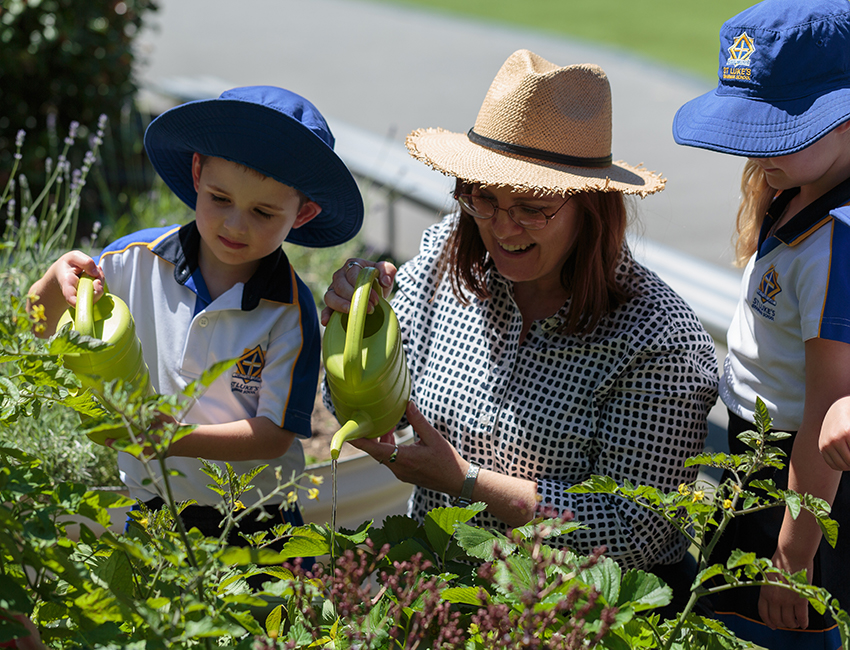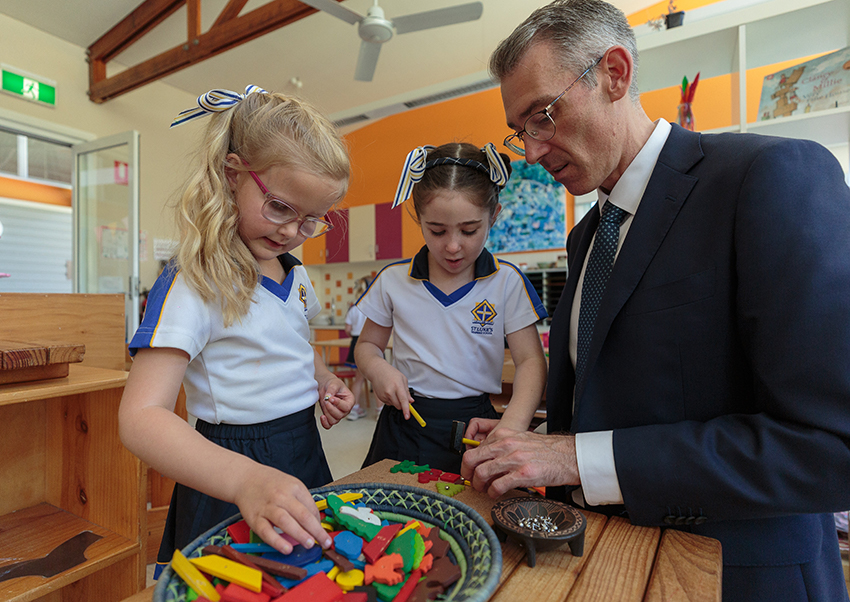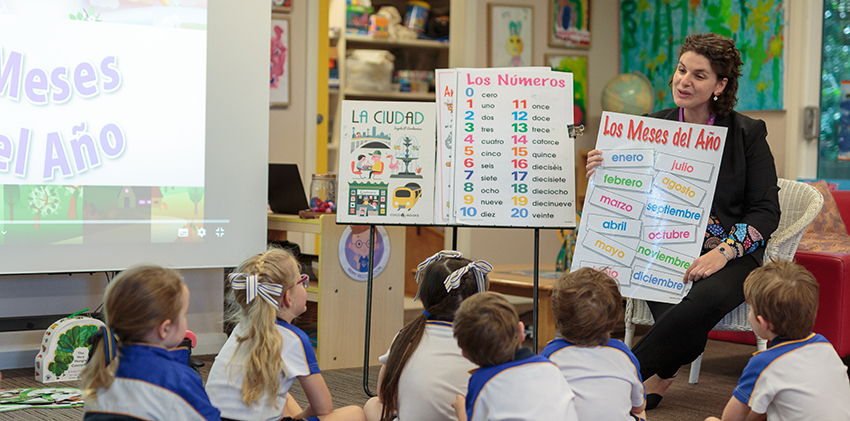Pre-K (Cottage) Structure & Hours
There are 2 offerings - a 5-Day program and a 3-Day program (Mon-Wed).
The Cottage Day is structured as follows:
7.00 am - 8.00 am (Optional - Before School Care - Additional Charge Dee Why Only)
8.00 am - 8.30 am (Optional - Playground Supervision, both Campuses)
8.30 am - 2.45 pm Cottage Program Dee Why
8.30 am - 2.50 pm Cottage Program Bayview
2.45 pm - 6.00 pm (Optional - After School Care - Additional Charge, Dee Why)
2.50 pm - 6.00pm (Optional - After School Care - Additional Charge, Bayview)

Pre-K (Cottage) Curriculum
The Cottage Program provides a developmentally appropriate blend of play-based and more formalised learning activities in a resource-rich environment. In addition to Literacy, Numeracy and experiential play, Cottage students receive specialist teaching in Music, Languages, PE, Christian Studies, Art and Information Skills.
Literacy Development
The foundations for early literacy and numeracy development are laid before children start school.
The Cottage program focuses on the development of four core skills.
- Phonemic awareness helps students to develop an ear for sounds in words. They learn how to break words into sound units and make connections between words that sound the same. These are vital skills to develop before learning to read and write.
- Phonics is developing a link between the sounds students hear and the letters that represent these sounds. A structured literacy program is used from Cottage, to help students to build these associations.
- Vocabulary involves students having a rich oral language. Engaging in conversations, listening to quality stories, singing and familiar rhymes help students to expand their fascination with new words.
- Comprehension is both being able to understand the literal and inferential aspects of stories and information texts. Reading a wide range of stories helps them to understand that meaning is communicated through more than the words we say. Pictures often contain additional cues that help us to understand the full meaning.
Numeracy Development
The first stages of numeracy development require children to engage in collecting, sorting, ordering, sharing and classifying objects. It is important that children develop a strong association between mathematical words and symbols and the objects, groups or actions they are used to describe. The first steps in developing mathematical thinking is for children to test what happens, for example, when groups of objects are added together, when they are shared or sorted into smaller groups.
They also need to be encouraged to develop a strong link between learning in Mathematics and the day-to-day world around them. Counting, measuring objects and recognising and using shapes in their regular environment adds meaning and relevance to new concepts.

Pre-K (Cottage) Specialist Lessons
Cottage students at St Luke’s Grammar School learn with subject specialists in a range of areas. These programs commence in Cottage, involving the students in engaging and educational activities.
The children develop relationships with our Specialist teachers and feel comfortable moving to different classrooms for their lessons.
Specialist Lessons
- Spanish lessons introduce children to the basics of the Spanish language at a stage in their development when a child’s brain is ripe to learn a new language. Listening and speaking activities also have proven benefits to English learning as students become more aware of how language works. These lessons also help students to expand their view of the world and build empathy as they learn about another culture.
- Physical Education lessons help to build physical fitness, gross motor and ball skills. During the course of the year they will participate in a wide range of activities, including gymnastics, dance, modified soccer, hockey or basketball.
- Music lessons reinforce skills in listening, playing and singing. Students all sing, move and play percussion instruments to develop their sense of rhythm and their awareness of the tempo and dynamics.
- Visual Arts lessons encourage children to explore a wide range of techniques, including painting, drawing, printing and sculpture. These lessons also provide a context for building vital fine motor skills.
- Information Literacy involves students borrowing from the Learning Hub (Library) each week. They learn to identify different types of books and where these can be located. As students move through the School, these lessons will involve students learning to access digital texts, to learn research skills and how to evaluate the quality of source material.

Pre-K (Cottage) Wellbeing
Social & Emotional Development
In a school environment, children are not just learning academic skills. They are learning how to be part of a community and to learn with others. The children learn to interact with different personalities and to negotiate with others. Children receive support to develop their social interaction skills, just as they learn any other skills at school. The Cottage program helps children to understand their strengths and talents and to recognise and value the strengths of others. They learn to see how they are similar and different to their peers and are encouraged to value diversity within their School community.
The children learn they have choices in how they respond to situations and are supported as they learn to make sensible, positive choices that will benefit themselves and others. There is consistent evidence that academic achievement is not just the result of intellectual development but is strongly influenced by social and emotional dispositions. Our learners need to see that, even when something is challenging, they have an opportunity to learn new skills and grow as a learner. They are encouraged to work through frustration and setbacks and to celebrate progress.
The characters contained within the LEARNING@STLUKE’S framework, including Remy Restoration, Riley Resilience, Reece Resourcefulness, Ruby Reciprocity and Ronnie Reflectiveness are characters who help to reinforce positive learning dispositions.
- Remy Restoration reminds us that we all make mistakes. We all need to be able to say sorry and to forgive others.
- Riley Resilience teaches children that setbacks and frustration are a common part of the learning journey but they can bounce back.
- Reece Resourcefulness helps children to see how they can draw on a range of resources to solve problems.
- Ruby Reciprocity teaches children how to be a good friend to others, being kind and respectful.
- Ronnie Reflectiveness reminds children to stop and think about what they have learned so far and where to go next on their journey.
Physical Development
This is where children have the opportunity to extend their gross motor (large muscle) skills such as hand/eye and foot/eye co-ordination, jumping, running, climbing, catching and throwing, music and movement and balance and fine motor (small muscle) skills including the skills required for pre-writing and drawing, cutting with scissors, threading, art and craft experiences, and construction.
Spiritual Development
As a member of the Anglican School Corporation, we want our students to learn about the message of the Bible. Each week children in Cottage will participate in a Christian Studies lesson. Children learn about God’s love for them through age-appropriate stories, songs and activities. Throughout the school day, there is an emphasis on the values that underpin the Christian message. Children are encouraged to see how their words and actions impact on others.
